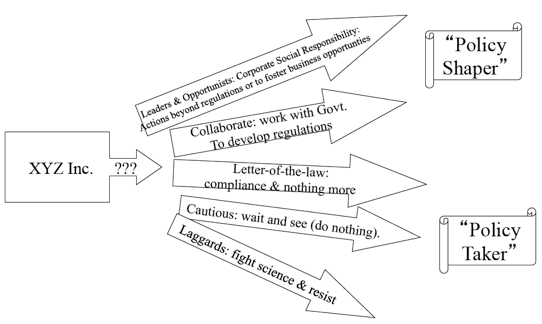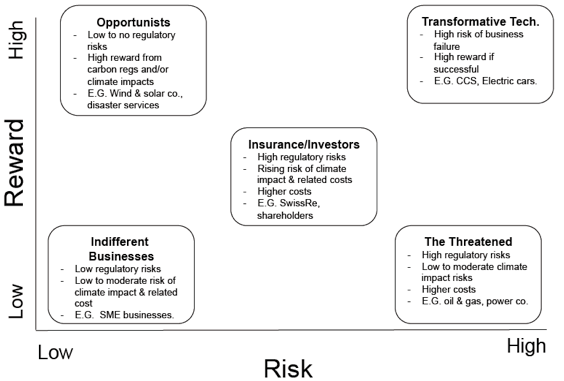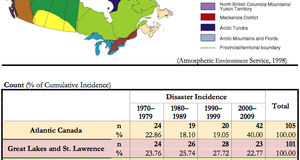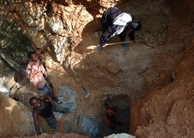From Earth Common Journal VOL. 3 NO. 1Climate Change Strategies 101Business and Climate Change StrategiesBusinesses face climate change risks related to being regulated for carbon—especially among high emitting companies—and also risks related to the real impacts of climate change and resulting financial losses. Some companies do not experience either of these risks and may have considerable new business opportunities. Figure 4 illustrates a number of strategic options businesses have in responding to climate risks. Businesses that choose options in the upper half of Figure 4 tend to become shapers of government policy, while those in the lower half tend to become the recipients of policy without much of a role in developing it. Figure 4. Business climate change strategic response options.
Carbon Regulatory Risk Risks regarding carbon regulations differ depending on the type of business. Figure 5 illustrates different classes of businesses based on their risk or reward exposure. Corporate strategies for climate change will differ depending on their risk/reward exposure. Indifferent companies have a low risk-low reward profile, but could still be at risk from the real impacts of climate change (e.g. extreme weather events, rising sea levels). Threatened companies have high greenhouse gas emissions profiles and are at the highest risk of being regulated for “carbon,” thereby increasing their costs of doing business. Opportunist companies have a high reward-low risk framework and could prosper under carbon regulations, as market share shifts their way. Investors face moderate risks of exposure to carbon regulations, unless they take measures to reduce their risks. For example, some investors are shifting away from the fossil fuel sector to the clean technology sector. The re-insurance industry is becoming increasingly concerned with the rising costs of severe weather events that are likely becoming more frequent or intense in a warming world. The Transformative Tech sector faces high risks of not succeeding in the market, but also faces very high rewards if carbon regulations become more stringent and they gain market share. Figure 5. Risk/reward classification of various business types.
Climate Impact Risks Companies of any size could face financial losses related to the impacts of climate change. Homeowners and small businesses can face hundreds of thousands to million dollars losses from the higher frequency or intensity of hurricanes, tornados, floods or severe thunderstorms. Larger corporations can face losses to capital infrastructure assets or lost productivity in the 10s to 100s of million dollars from a variety of climate related problems (e.g. damaged offshore drilling rigs from hurricanes, lost revenues for hydroelectric plants due to low rainfall, damaged industrial plants related to river flooding). Some companies are using risk management approaches to manage their climate impact risks. SummaryThere is a high degree of scientific certainty that burning fossil fuels (and cutting down forests) is altering the climate system and this will bring mostly harmful impacts to humans and ecosystems. Most governments accept the science and use climate change strategies and action plans to signal their intent to take policy action. Businesses are also responding by developing climate change strategies to either hedge their risk of being regulated, hedge their risk related to severe weather events, and/or to take advantage of climate business opportunities. AcknowledgementsThis paper was improved considerably by the constructive suggestions of two anonymous peer reviewers. Dr. Jeremy Macdonald, Stevens Institute of Technology, New Jersey also provided many helpful suggestions. Betty Macdonald and the students of MacEwan University’s EASC 373 course also provided valuable advice.
ReferencesAuditor General Alberta (2011). Climate Change and Emissions Management Fund —Use of Offsets for Compliance with Regulations Retrieved April 4, 2013, from http://www.oag.ab.ca/?V_DOC_ID=974 Auditor General of British Columbia (2013). An Audit of Carbon Neutral Government. Retrieved April 12, 2013, from http://www.bcauditor.com/pubs/2013/report14/audit-carbon-neutral-government Cook, J., Nuccitelli, D., Green, S., Richardson, M., Winkler, B., Painting, R., Way, R., Jacobs, P. and Skuce, A. (2013). Environ. Res. Lett. 8 024024 doi:10.1088/1748-9326/8/2/024024 Hofmeister, J. (2010). Why we hate the oil companies, Palgrave MacMillian. IPCC, 2007: Climate Change (2007). Synthesis Report. Contribution of Working Groups I, II and III to the Fourth Assessment Report of the Intergovernmental Panel on Climate Change [Core Writing Team, Pachauri, R.K and Reisinger, A. (eds.)]. IPCC, Geneva, Switzerland, 104 pp. Macdonald, D. E. (2011). Climate change policy 101. MacEwan University, Earth Common Journal, Vol. 1, No. 1. McKinsey, (2009). Pathways to a Low-Carbon Economy (version 2 of the Global Greenhouse Gas Abatement Cost Curves). McKinsey & Company. Retrieved April 12, 2013 from https://solutions.mckinsey.com/climatedesk/default.aspx NRTEE (2012). Reality Check: The State of Climate Progress in Canada, National Roundtable on the Environment and the Economy. Retrieved April 12, 2013, from http://collectionscanada.gc.ca/webarchives2/20130322165455/http://nrtee- trnee.ca/reality-check-the-state-of-climate-p Suggested Reading from Inquiries Journal
Inquiries Journal provides undergraduate and graduate students around the world a platform for the wide dissemination of academic work over a range of core disciplines. Representing the work of students from hundreds of institutions around the globe, Inquiries Journal's large database of academic articles is completely free. Learn more | Blog | Submit Latest in Environmental Studies |



















